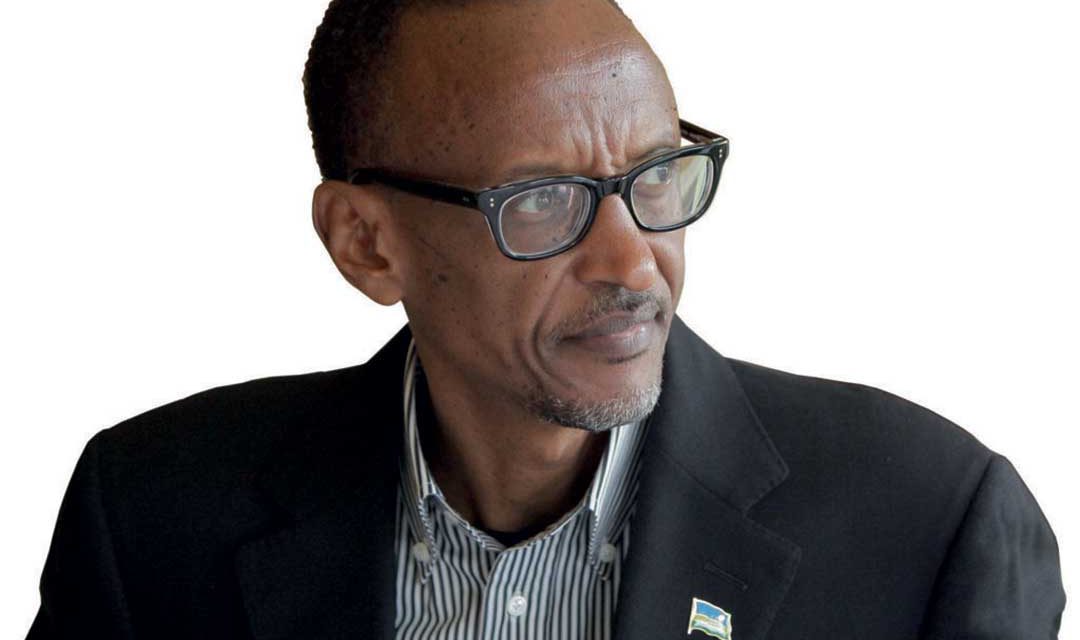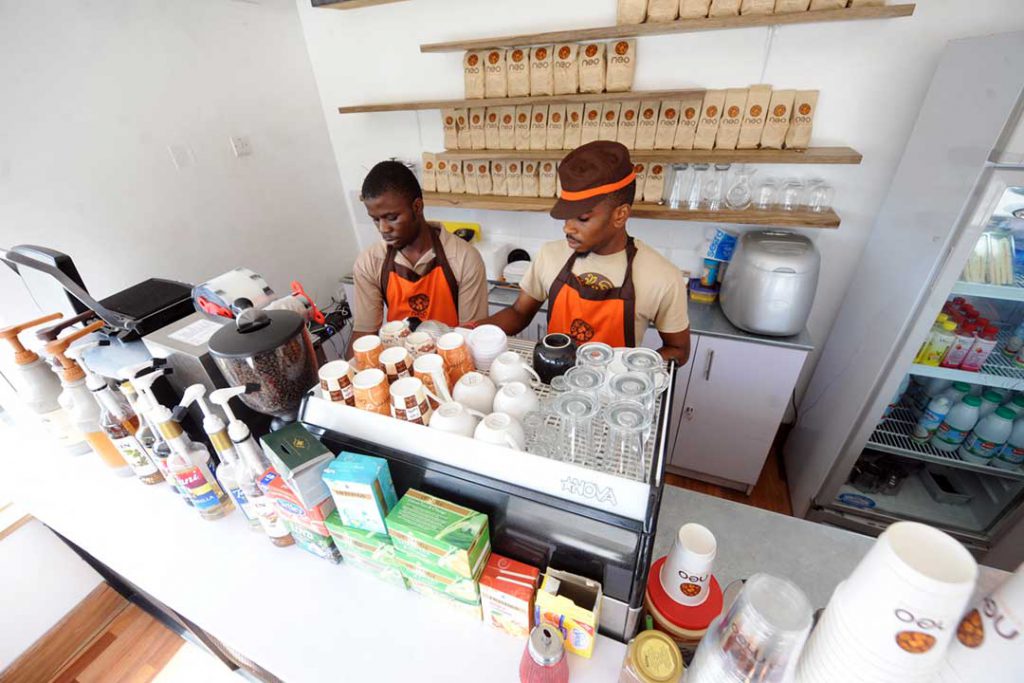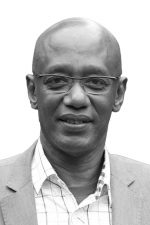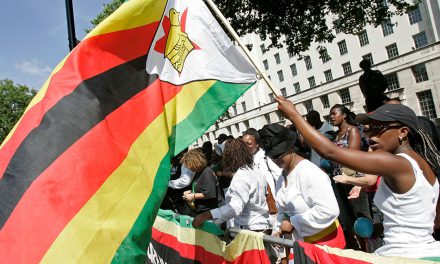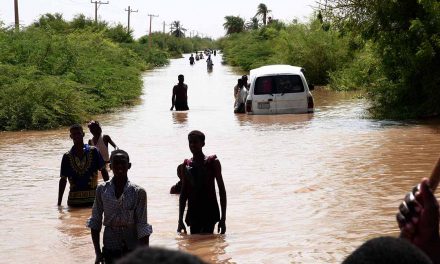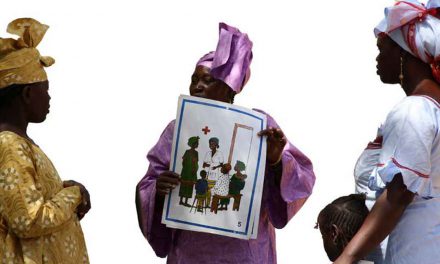Stewards at Cafe Neo prepare cafee for clients on December 4, 2014 in Lagos. Photo: Pius Utomi Ekpei/AFP
Rwanda has acquired the reputation of a rags-to-riches nation. Internationally, President Paul Kagame’s claim to have turned Rwanda into an economic lion “firmly on the path to economic maturity” has been reflected in glowing plaudits. Rwanda “has become a development success story and unity and reconciliation have been consolidated, strengthening good governance”, according to the African Development Bank (ADB). The World Economic Forum (WEF) ranks Rwanda as Africa’s third most competitive economy after Mauritius and South Africa. Investors have also enthused about the Rwanda Stock Exchange (RSE), incorporated in October 2005. It “might not have the volume, but it is looking increasingly attractive”, according to the Financial Times. An investor site focusing on “frontier markets” rated Rwanda as “one of the hottest markets in Africa since its debut” in 2013. Shalifay, the company that runs the Investment Frontier site, says it “endeavours to find investment opportunities in markets that are not fully developed and economies that have leaps and bounds to grow”.
It maintains an index, SIF30, which tracks 30 countries that it believes are growing fast and likely to provide good opportunities for investors. But the hype about Rwanda’s new bourse needs to be put in perspective. First, the RSE’s short history has been subject to mystification. In fact, its de facto incorporation was delayed until 2008, under the Rwandan Companies Act. According to an interview with an official, the company only started operations in November 2010 with the launch of the first Rwandan initial public offering (IPO). Since its establishment the RSE has launched only three shares that trade on its primary market. In the first IPO, the Rwanda government sold its 30% stake in the brewing company Bralirwa, and the equivalent of $29.5m was raised, according to a company press release at the time. In the second IPO in 2011, the Rwandan government sold its 45% stake in Bank of Kigali (BK) for $62.5m. Rwanda’s third locally based listing transpired three years later, on May 21 2015, with the sale of the 20% stake held by Crystal Ventures Ltd (CVL) in MTN Rwandacell, a joint venture with South Africa’s MTN Group.
On the first day of trading, a share traded for 144 Rwandan francs ($0.20) and three deals were made involving a total of 886,000 francs ($1,194). But earnings from the entire IPO phase were not made public. The lack of openness may indicate that the IPO flopped, and few investors rushed to buy the stock. Even so, Crystal Telecom, a wholly owned subsidiary of CVL, began trading its 20% share in MTN Rwanda on the RSE’s secondary market on July 16 this year. CVL, which plays a central role in the Rwandan stock exchange, is no ordinary company. It is a conglomerate owned by the ruling party, the Rwandan Patriotic Front (RPF), and includes construction, road-building, real estate and furniture companies, granite and tile factories, upmarket coffee shops (in Rwanda and overseas) and an agro-processing venture. With purported assets of $500m, CVL is “perhaps the largest quasi-private business venture in the country, and with 7,000 staff, the second-largest employer after the state”, according to a Financial Times special report.
Meanwhile RSE’s secondary capital market has seven listed companies. Of these, three are the above-mentioned Bralirwa, Bank of Kigali and MTN Rwandacell. Four are Kenyan companies primarily listed on the Nairobi Stock Exchange (NSE) and cross-listed on the RSE: Nation Media Group, the Kenya Commercial Bank Group, Uchumi Supermarkets and Equity Group Holdings. With a market capitalisation of 3.5 billion francs (or $4.8m), and having raised capital through two IPOs totalling $92m from 2010 to May 21st 2015, the RSE primary market is hardly a robust mobiliser of money. The RSE’s secondary market is best understood as a junior partner to the NSE, with a market capitalisation of 2.3 billion francs ($23m). Second, to evaluate the Rwanda stock exchange requires examining its economic environment. The country’s economy remains essentially informal and heavily dependent on foreign aid, with inadequate physical infrastructure. Rwanda is one of the world’s poorest countries.
The World Bank ranks it 198th out of 212 economies. Of the East African Community’s five countries, only Burundi with a GDP per capita of $295 is poorer. Kenya, the regional powerhouse, has a GDP of $60.9 billion and per capita of $1,337—more than twice that of Rwanda’s $652, according to the World Bank. All this has implications for the country’s tax base. In 2013 Rwanda had 113,198 taxpayers, but only 354 were considered “large” with an annual turnover of over 200m francs ($277,990). By comparison, the “large taxpayer” in Kenya has an annual turnover of over 750m Kenyan shillings ($7.5m), according to the Kenya Revenue Authority. This reflects Rwanda’s “miniscule” private sector, according to Rene C. Mugenzi, writing for the Pambazuka News website. The limited contribution of the country’s private sector to the economy is also mirrored in the country’s low level of formal employment. Of the country’s 5.5m economically active people, only 309,648 held jobs in private and public sectors in 2013. Put another way, 94.4% of people between 15 and 65 were employed in Rwanda’s informal economy, according to official Rwandan figures.
Additionally, only 267,400 workers contributed to Rwanda’s Social Security Board—a requirement that is strenuously enforced. With such a small tax base, Rwanda is highly dependent on foreign help. In 2013, for example, Rwanda received $1.1 billion in aid, a figure that reveals the absurdity of Rwanda as a success story. Foreign aid comprises 14.6% of Rwanda’s gross national income, 54.2% of its capital formation, 41.3% of imports of goods, services and primary income and 110% of central government expenditure, according to the World Bank. The third main point is that the government says it is open for business because Rwanda desperately needs investment. But companies face constraints, especially official heavy handedness towards investors. The US State Department’s 2014 Rwanda Human Rights Report cites the case of Tribert Rujugiro Ayabatwa, a Rwandan businessman. (This writer worked as a consultant for Mr Ayabatwa.) Claiming that his businesses were “abandoned” because Mr Ayabatwa did not live in Rwanda, government seized his shares in a tea factory, as well as his private residence in Kigali.
“In 2013, the government expropriated Mr Ayabatwa’s $20m shopping mall, the Union Trade Centre, which he built in that city in 2006,” according to the report. Several companies have suffered the same fate, including the American oil company Chevron, which was unceremoniously forced out of Rwanda in 2008, according to an American embassy cable revealed by Wikileaks. Part of the problem is that the state and ruling party are not neutral keepers of regulatory institutions. Rather, they double up as business operators and use state power to frustrate competition. The country’s undeveloped economic infrastructure is another serious hurdle. In Rwanda, most households still rely on wood or charcoal for heating and cooking. Petroleum accounts for only 11% of primary energy consumption, while electricity usage is a mere 4%. Mr Kagame criticises those who see socioeconomic development as a long-term challenge. “Development is a marathon that must be run at a sprint,” he says. “In our pursuit of progress, we have of course looked to East Asia’s so called ‘tiger’ economies for inspiration.”
He says he is building a Singapore in the heart of Africa, but it is difficult to fathom why reputable institutions are taken in by his claims that development can be accomplished at speed. As we have seen, the RSE presently offers only seven shares, three of them cross-listings, while Rwanda’s economy remains extremely undiversified. It may be true that Rwanda is one of 30 developing countries included in a special “frontier markets” investor’s tracking index, economies seen as likely to yield good results over the next 40 years. Given its tiny size, an investor who is interested in returns is likely to consider many other options before the RSE.
David Himbara is an educator, political economist and author. He has taught at the University of Witwatersrand, Johannesburg, and consulted for the Central University of Technology in Bloemfontein, South Africa and the African Development Bank in Tunisia

